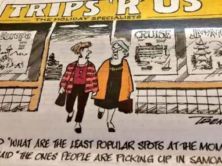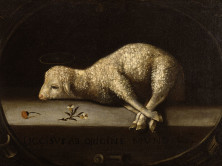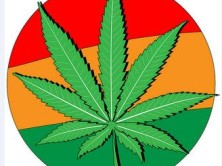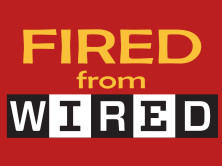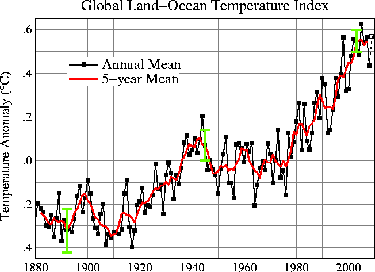
A NASA map of global land/ocean temperature. (Courtesy of NASA, GISS)
There’s been a lot of media commentary on the hacked emails from the Climate Research Unit at the University of East Anglia; opinions about the controversy and analysis of the content of the emails themselves abound. Some science media have already dissected the controversy in detail but the emails still seem to merit more independent analysis.
Now FactCheck.org (usually a political watchdog) has posted a detailed rundown on the emails, discussing what they’ve been purported to contain and what they actually contain point by point, as well as offering comment on media coverage of the exposed communication that they write “may have contributed to public confusion on the subject.”
Some important points from the fact-check of the climate change e-mails ‘Climategate’ include:
1. Claims that the emails call into question the reality of anthropogenic or “human caused” climate change are false. FactCheck.org reports:
Skeptics claim this trove of e-mails shows the scientists at the U.K. research center were engaging in evidence-tampering, and they are portraying the affair as a major scandal: “Climategate.”
…We find such claims to be far wide of the mark.
2. Facts show that though emails reveal scientists’ desire to keep papers they think are incorrect out of the IPCC report, in at least one quoted instance, they did not actually (or were not actually able to) enact their desire. FactCheck.org states:
In one 2004 e-mail that’s come under much scrutiny, Jones wrote of two controversial papers that “Kevin and I will keep them out [of the IPCC report] somehow — even if we have to redefine what the peer-review literature is!” But both papers under discussion, Kalnay and Cai (2003) and McKitrick and Michaels (2004), were cited in one of the three working group reports from which the 2007 IPCC report is synthesized.
3. FactCheck.org writes: “Claims that the e-mails are evidence of fraud or deceit… misrepresent what they actually say.” They explain:
A prime example is a 1999 e-mail from Jones, who wrote: “I’ve just completed Mike’s Nature trick of adding in the real temps to each series for the last 20 years (i.e., from 1981 onwards) and from 1961 for Keith’s to hide the decline.” Skeptics claim the words “trick” and “decline” show Jones is using sneaky manipulations to mask a decline in global temperatures. But that’s not the case. Actual temperatures, as measured by scientific instruments such as thermometers, were rising at the time of the writing of this decade-old e-mail, and (as we’ve noted) have continued to rise since then. Jones was referring to the decline in temperatures implied by measurements of the width and density of tree rings. In recent decades, these measures indicate a dip, while more accurate instrument-measured temperatures continue to rise.
4. They write: “Other quotes that skeptics say are evidence of ‘data manipulation’ actually refer to how numbers are presented, not to falsifying those numbers.” FactCheck.org cites:
For instance, in one e-mail climate scientist Tom Crowley writes: “I have been fiddling with the best way to illustrate the stable nature of the medieval warm period.” Crowley is referring to the best way to translate the data into a graphic format.
5. Deliberate obstruction of skeptics’ requests for data through FOIA requests may or may not have taken place. FactCheck.org states:
It’s clear from the e-mails that there are people with whom the scientists would rather not share. What’s less clear is whether any deliberate obstruction actually occurred — that’s one of the subjects of the East Anglia investigation.
Check out the full report, with a more detailed discussion of each point here.

